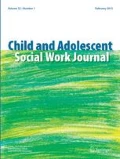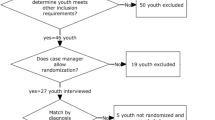Abstract
Intensive Alternative Family Treatment (IAFT®) is an enhanced therapeutic foster care program that serves children and youth at risk for entry into a more restrictive level of care. The purpose of this study was to examine the effectiveness of IAFT in reducing first entry into psychiatric residential treatment compared to usual care. We linked IAFT program data to Medicaid claims data in order to develop a quasi-experimental study design to compare outcomes for two groups (N = 1655): (a) youth referred to IAFT who received services and (b) youth referred to IAFT who did not receive IAFT services (i.e., usual care). Propensity score analysis was used to balance treatment and comparison groups on pre-referral indicators. Cox regression analysis was used to examine group differences. Findings supported a significant reduction in risk for entry to psychiatric residential treatment favoring IAFT (hazard ratio 0.72; 95% CI 0.55, 0.93). Results of this study support IAFT’s efficacy as an intensive therapeutic foster care model for delivering mental health services and viability as an alternative to residential care.

Similar content being viewed by others
References
Åström, T., Bergström, M., Håkansson, K., Jonsson, A. K., Munthe, C., Wirtberg, I., Wiss, J., & Sundell, K. (2019). Treatment Foster Care Oregon for delinquent adolescents: A systematic review and meta-analysis. Research on Social Work Practice. https://doi.org/10.1177/1049731519890394.
Berzin, S. C. (2010). Understanding foster youth outcomes: Is propensity scoring better than traditional methods? Research on Social Work Practice, 20(1), 100–111. https://doi.org/10.1177/1049731509331873.
Breland-Noble, A. M., Farmer, E. M. Z., Dubs, M. S., Potter, E., & Burns, B. J. (2005). Mental health and other service use by youth in therapeutic foster care and group homes. Journal of Child and Family Studies, 14(2), 167–180. https://doi.org/10.1007/s10826-005-5045-5.
Chamberlain, P., & Reid, J. B. (1998). Comparison of two community alternatives to incarceration for chronic juvenile offenders. Journal of Consulting and Clinical Psychology, 66(4), 624–633. https://doi.org/10.1037/0022-006X.66.4.624.
Dorsey, S., Farmer, E. M. Z., Barth, R. P., Greene, K. M., Reid, J., & Landsverk, J. (2008). Current status and evidence base of training for foster and treatment foster parents. Children and Youth Services Review, 30(12), 1403–1416. https://doi.org/10.1016/j.childyouth.2008.04.008.
Farmer, E. M. Z., Burns, B., Wagner, H. R., Murray, M., & Southerland, D. G. (2010). Enhancing “usual practice” treatment foster care: Findings from a randomized trial on improving youths’ outcomes. Psychiatric Services, 61(6), 555–561. https://doi.org/10.1176/ps.2010.61.6.555.
Festinger, T., & Baker, A. J. L. (2013). The quality of evaluations of foster parent training: An empirical review. Children and Youth Services Review, 35(12), 2147–2153. https://doi.org/10.1016/j.childyouth.2013.10.009.
Guo, S. & Fraser, M. (2015). Propensity score analysis: Statistical methods and applications. Sage.
Hahn, R. A., Bilukha, O., Lowy, J., Crosby, A., Fullilove, M. T., Liberman, A., Moscicki, E., Snyder, S., Tuma, F., Corso, P., & Schofield, A. (2005). The effectiveness of therapeutic foster care for the prevention of violence. American Journal of Preventive Medicine, 28(2), 72–90. https://doi.org/10.1016/j.amepre.2004.10.007.
Hambrick, E. P., Oppenheim-Weller, S., Nzi, A. M., & Taussig, H. N. (2016). Mental health interventions for children in foster care: A systematic review. Children and Youth Services Review, 70, 65–77. https://doi.org/10.1016/j.childyouth.2016.09.002.
Imbens, G. W., & Wooldridge, J. M. (2009). Recent developments in the econometrics of program evaluation. Journal of Economic Literature, 47(1), 5–86. https://doi.org/10.1257/jel.47.1.5.
James, S., Leslie, L. K., Hurlburt, M. S., Slymen, D. J., Landsverk, J., Davis, I., Mathiesen, S. G., & Zhang, J. (2006). Children in out-of-home care: Entry into intensive or restrictive mental health and residential care placements. Journal of Emotional and Behavioral Disorders, 14(4), 196–208. https://doi.org/10.1177/10634266060140040301.
Lanier, P., Jensen, T., Bryant, K., Chung, G., Rose, R., Smith, Q., & Lackmann, L. (2020). A systematic review of the effectiveness of children’s behavioral health interventions in psychiatric residential treatment facilities. Children and Youth Services Review. https://doi.org/10.1016/j.childyouth.2020.104951.
Lee, J. H., & Holland, T. P. (1991). Evaluating the effectiveness of foster parent training. Research on Social Work Practice, 1(2), 162–174. https://doi.org/10.1177/104973159100100204.
Leve, L. D., Harold, G. T., Chamberlain, P., Landsverk, J. A., Fisher, P. A., & Vostanis, P. (2012). Practitioner review: Children in foster care—vulnerabilities and evidence-based interventions that promote resilience processes. Journal of Child Psychology and Psychiatry, 53(12), 1197–1211. https://doi.org/10.1111/j.1469-7610.2012.02594.x.
Meadowcroft, P., Thomlison, B., & Chamberlain, P. (1994). Treatment foster care services: A research agenda for child welfare. Child Welfare, 73(5), 565–581.
Mihalo, J. R., Strickler, A., Triplett, D. R., & Trunzo, A. C. (2016). Treatment foster parent satisfaction: Survey validation and predictors of satisfaction, retention, and intent to refer. Children and Youth Services Review, 62, 105–110. https://doi.org/10.1016/j.childyouth.2016.02.001.
Piescher, K., Schmidt, M., & LaLiberte, T. (2008). Evidence-based practice in foster parent training and support: Implications for treatment foster care providers. Center for Advanced Studies, University of Minnesota. https://cascw.umn.edu/portfolio-items/ebp-in-foster-parent-training-tfc-pub/
Preyde, M., Frensch, K., Cameron, G., White, S., Penny, R., & Lazure, K. (2011). Long-term outcomes of children and youth accessing residential or intensive home-based treatment: Three year follow up. Journal of Child and Family Studies, 20(5), 660–668. https://doi.org/10.1007/s10826-010-9442-z.
Price, J. M., Chamberlain, P., Landsverk, J., Reid, J. B., Leve, L. D., & Laurent, H. (2008). Effects of a foster parent training intervention on placement changes of children in foster care. Child Maltreatment, 13(1), 64–75. https://doi.org/10.1177/1077559507310612.
Rapid Resource for Families. (n.d.). What is IAFT? Retrieved February 18, 2020, from https://ncrapidresource.org/services/iaft/
Redding, R. E., Fried, C., & Britner, P. A. (2000). Predictors of placement outcomes in treatment foster care: Implications for foster parent selection and service delivery. Journal of Child and Family Studies, 9(4), 425–447. https://doi.org/10.1023/A:1009418809133.
Reddy, L., & Pfeiffer, S. (1997). Effectiveness of treatment foster care with children and adolescents: A review of outcome studies. Journal of the American Academy of Child & Adolescent Psychiatry, 36, 581–588.
Rock, K. E., & McNeil, C. B. (2011). Evaluation of foster parent training programs: A critical review. Child & Family Behavior Therapy, 33(2), 139–170. https://doi.org/10.1080/07317107.2011.571142.
Rose, R. A., & Lanier, P. (2017). A longitudinal study of child maltreatment and mental health predictors of admission to psychiatric residential treatment facilities. International Journal of Environmental Research and Public Health, 14(10), 1141. https://doi.org/10.3390/ijerph14101141.
Rosenbaum, P. R., & Rubin, D. B. (1984). Reducing bias in observational studies using subclassification on the propensity score. Journal of the American statistical Association, 79(387), 516–524.
Rubin, D. R. (2005). Causal inference using potential outcomes. Journal of the American Statistical Association, 100(469), 322–331. https://doi.org/10.1198/016214504000001880.
Sanchirico, A., & Jablonka, K. (2000). Keeping foster children connected to their biological parents: The impact of foster parent training and support. Child and Adolescent Social Work Journal, 17(3), 185–203. https://doi.org/10.1023/A:1007583813448.
Seibert, J., Feinberg, R., Ayub, A., Helburn, A., & Gibbs, D. (2018). State practices in treatment/therapeutic foster care. https://aspe.hhs.gov/system/files/pdf/259121/TREATMENTFOSTERCARE.pdf
Snodgrass, R. (1989). Treatment foster care: A proposed definition. Community Alternatives: International Journal of Family Care, 1, 79–82.
Stuart, E. A. (2010). Matching methods for causal inference: A review and a look forward. Statistical Science, 25(1), 1–21. https://doi.org/10.1214/09-STS313.
Turner, W., & Macdonald, G. (2011). Treatment foster care for improving outcomes in children and young people: A systematic review. Research on Social Work Practice, 21(5), 501–527. https://doi.org/10.1177/1049731511400434.
U.S. Department of Health and Human Services. (2017). The AFCARS report: Preliminary FY 2016–estimates as of Oct 20 (No. 24; p. 6). https://www.acf.hhs.gov/sites/default/files/cb/afcarsreport24.pdf
Yampolskaya, S., Mowery, D., & Dollard, N. (2014). Profile of children placed in residential psychiatric program: Association with delinquency, involuntary mental health commitment, and reentry into care. American Journal of Orthopsychiatry, 84(3), 234–243. https://doi.org/10.1037/h0099808.
Funding
This study was funded by Rapid Resources for Families, the purveyors of Intensive Alternative Family Treatment (IAFT). This research was funded by Rapid Resource for Families (https://ncrapidresource.org/).
Author information
Authors and Affiliations
Contributions
PL was the principal investigator for this study, has full access to all data, and is responsible for the integrity of the data in the study and accuracy of the data analysis. RR led the study design development including methodology and data analysis approach. GC conducted the literature review and supported development of the manuscript. We want to thank the Rapid Resources for Families staff (DN, RL, PM, and BR) for their support with development of the research plan.
Corresponding author
Ethics declarations
Conflict of interest
This research is funded by Rapid Resource for Families and may lead to the development of services, such as Intensive Alternative Family Treatment, which may be licensed to Rapid Resource for Families. We have disclosed those interests fully to the University of North Carolina at Chapel Hill, the publisher, and have in place an approved plan for managing any potential conflicts arising from this arrangement.
Ethical Approval
This study was approved by the University of North Carolina at Chapel Hill Office of Human Research Ethics #18-2267.
Additional information
Publisher's Note
Springer Nature remains neutral with regard to jurisdictional claims in published maps and institutional affiliations.
Rights and permissions
About this article
Cite this article
Lanier, P., Chung, G. & Rose, R. A Quasi-Experimental Study of Intensive Alternative Family Treatment to Prevent Entry of Youth to Psychiatric Residential Treatment. Child Adolesc Soc Work J 39, 303–311 (2022). https://doi.org/10.1007/s10560-021-00758-9
Accepted:
Published:
Issue Date:
DOI: https://doi.org/10.1007/s10560-021-00758-9



